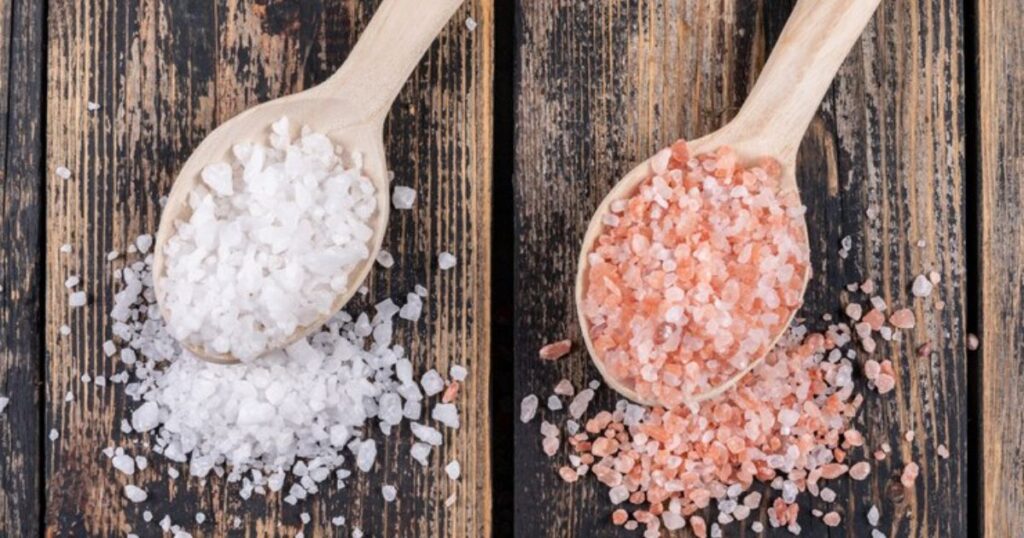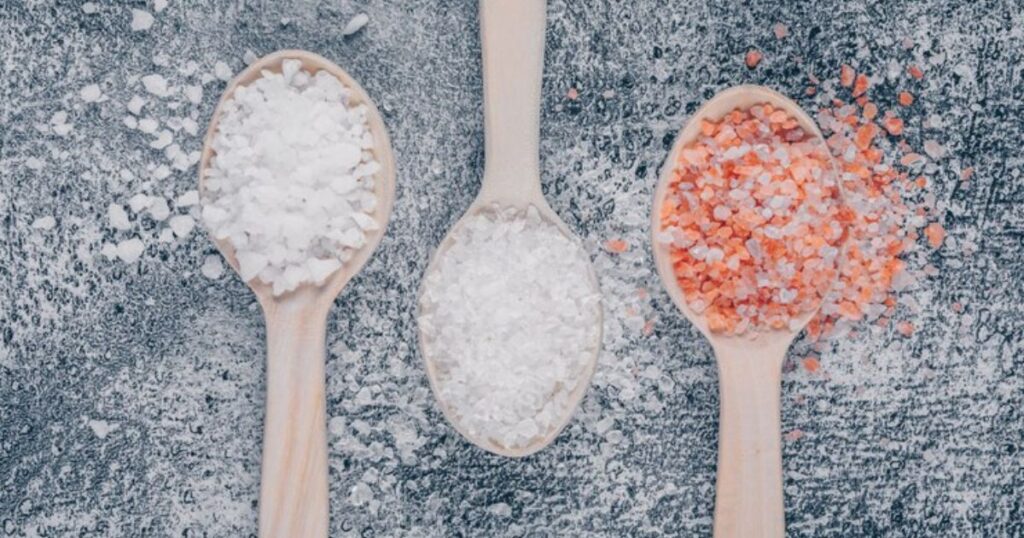Salt is something we use in almost every meal, but there are different types of salt. You might have seen some recipes asking for kosher salt, while others say to use sea salt. If you’ve ever wondered why, you’re not the only one!
These two types of salt are special in their own ways, and they can really change the way your food tastes. In this article, we’re going to talk about how kosher salt and sea salt are different. We’ll explain things like how they feel, how they affect your health, and how to pick the right one for your cooking.
What Is Kosher Salt?
One variety of salt that is well-known for its flaky, gritty texture is kosher salt. Its traditional use in the Jewish method of koshering meats draining the meat of its blood gives it its name. Kosher salt is typically devoid of chemicals such as iodine, which sets it apart as a straightforward and unadulterated option for seasoning.
- Texture and Grain Size: Kosher salt is coarser and flakier than many other salts. Its large grains make it easy to pinch and sprinkle over food, which is why chefs love it for seasoning.
- How It’s Made: Kosher salt is made by evaporating seawater or brine from salt mines, resulting in large, uneven flakes.
What Is Sea Salt?
As its name implies, sea salt is derived from seawater. It is obtained by allowing seawater to evaporate, and depending on where it comes from, it may contain different minerals. Because of this, sea salt has a distinct flavor that varies depending on the location.
- Texture and Grain Size: Sea salt can range from fine to coarse. The texture and grain size of sea salt often depend on the method of evaporation and the region where it is sourced.
- How It’s Made: Sea salt is created by collecting seawater and letting it evaporate naturally under the sun. The salt that remains is then harvested and may go through minimal processing, which helps retain its natural minerals.
What’s the Difference Between Sea Salt and Kosher Salt?
1. Texture
Compared to kosher salt, sea salt typically has a rougher texture. Depending on the variety of sea salt, the grain size can change, although it is typically flakier and more crystalline. Conversely, when sprinkled over food, kosher salt dissolves fast due to its big, flake-like texture.
2. Flavor
Because sea salt contains trace minerals, its flavor might be more nuanced. The flavor of sea salt might vary slightly depending on where it comes from. Generally speaking, kosher salt is purer and has a simple, clear flavor that enhances food’s inherent qualities rather than overpowering them.
3. Usage
Because of its flavor that is rich in minerals and its coarse texture, sea salt is frequently used as a finishing salt. It works well as a garnish for foods including salads, roasted veggies, and desserts.
On the other hand, kosher salt is more adaptable in the kitchen and is frequently used to season stews, soups, and meats. Its larger flakes make it simpler to regulate, ensuring that you don’t over-salt your food.
4. Mineral Content
The mineral concentration of the two salts is one of their main differences. The flavor of sea salt may be slightly changed by the trace amounts of minerals like calcium and magnesium it contains. These minerals are typically absent from kosher salt, giving it a clear, pure flavor.
5. Dissolving Speed
Because the grains of kosher salt are bigger, they tend to dissolve more slowly. This is especially helpful for evenly dispersing seasoning when adding it to meats. When instant saltiness is desired, sea salt, especially in its finer forms, dissolves more quickly and is frequently used in recipes.

When to Use Kosher Salt vs. Sea Salt?
Choosing the appropriate salt can make a significant impact in your cuisine. Depending on the recipe, both kosher salt and sea salt work well. Here’s an overview of when to use each category.
Uses of Kosher Salt in Cooking
Professional chefs rely heavily on kosher salt, and for good reason. Its large, flaky grains make it ideal for sprinkling on foods as a finishing touch, and its tendency to dissolve quickly makes it an excellent choice for seasoning while cooking.
- Brining: Kosher salt is commonly used in brining because of its ability to evenly season meats and draw out moisture.
- Chefs’ Favorite: Many chefs prefer kosher salt due to its clean flavor and the control it gives them over seasoning.
Uses of Sea Salt in Cooking
Sea salt is commonly used as a finishing salt, which means it is sprinkled on foods right before serving. Its distinct mineral concentration can provide a blast of flavor to any cuisine.
- Finishing Touch: Sea salt’s briny taste and crunchy texture make it a popular finishing salt for salads, meats, and even desserts.
- Specialty Uses: Sea salt is frequently used in artisanal dishes, where its natural flavor adds depth.

Which Salt Is Better for Your Health?
While kosher and sea salt have identical sodium concentration, sea salt has a tiny benefit in that it contains more minerals. However, the difference is negligible, and neither salt should be consumed excessively.
- Kosher Salt’s Impact on Health: Kosher salt is often chosen for its clean flavor and lack of additives, but it doesn’t contain the extra minerals found in sea salt.
- Sea Salt’s Impact on Health: Sea salt has a reputation for being healthier due to its trace minerals, but it’s still mostly sodium chloride, so moderation is key.
Related: Is Ciabatta Bread Healthy?
Conclusion
Both kosher salt and sea salt are helpful when cooking, and which one you use depends on what you’re making. Kosher salt is great for cooking and soaking food in salty water (brining). Sea salt is best for adding on top of food before you eat it to give it extra flavor. In the end, it’s up to what you like, but it’s smart to keep both types of salt in your kitchen.
People Also Ask
1. What is the difference between kosher salt and sea salt?
While sea salt is derived from evaporated seawater and can be either fine or coarse, kosher salt is formed from huge, flat crystals. Their construction and texture are the primary differences. Sea salt, which comes from the ocean, could have more minerals than kosher salt, which has a rougher texture.
2. Which salt is better for cooking: kosher salt or sea salt?
Both salts work well in cooking, although because of its texture, kosher salt is frequently simpler to pinch and distribute. Kosher salt is preferred by many cooks since it is easier to control because it has less salt in each pinch. If you want the added flavor of sea salt’s minerals, that’s nice too.
3. Can you use kosher salt and sea salt interchangeably?
You can, but you need to exercise caution when determining how much. Because kosher salt crystals are larger than those of sea salt, you may require more of it. You might need to change the amount if a recipe calls for sea salt and you want to use kosher salt instead.
4. Does kosher salt or sea salt taste different?
Sea salt may taste slightly different than kosher salt due to the minerals found in the ocean, but kosher salt has a clear, straightforward salt flavor. Certain individuals observe that sea salt has a slightly stronger flavor, particularly when it comes from a unique source like the Mediterranean Sea.
5. Is kosher salt healthier than sea salt?
Since the sodium content of both varieties of salt is equal, none is healthier than the other. Mineral content in sea salt could be extremely modest, yet the difference is negligible. The secret to a healthy diet is to use salt sparingly.









Leave a Reply